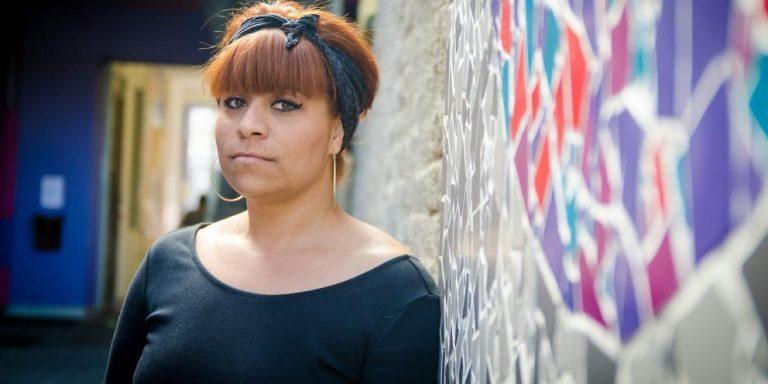Jana Balážová: Romani people need role models, and those grow up in the schools

The common education of all children together and the inclusion of children with disadvantages into normal schools is one of the main topics of political discussion today in the Czech Republic. Politicians and teachers are pointing out that the Czech schools are unprepared for this concept.
The Department of Education at Masaryk University in Brno is responding to inclusion with a new method for educating teachers to prepare them for these new conditions. What about those who are the object of inclusion, though?
Jana Balážová is a graduate of Masaryk University who has experience with inclusion from many different areas. As a Romani woman who attended a primary school on Křenová Street in Brno as a child, she was one of those perceived as disadvantaged by the education system of the time.
Balážová knows what it feels like to be a victim of prejudice. To this day she remembers the scenes during which the non-Romani parents of her friends prohibited them from playing with her as a child.
From today’s perspective, there was no reason for those parents to have done that other than that she was Romani. Balážová went on to graduate from a secondary school with a business focus and then from university with a Bachelor’s degree in social pedagogy.
For a while she worked as a teaching assistant, but for the last 14 years (with a break for maternity leave) she has been working as a field social worker for the nonprofit organization IQ Roma servis. “Ever since I was young my parents were enormous role models for me. Dad only had a fourth-grade education, both of my parents came from families with nine children, but despite that they worked their entire lives and wanted their children to achieve more than they had, to be educated. They wanted us to speak Czech well, so they didn’t speak Romani to us at home, and later Dad regretted that,” recalls Balážová, who sees the source of her parents’ motivation mainly in the fact that they met a diverse range of people during their own work lives.
A more difficult, but more promising, path
Balážová applies her life philosophy both to her clients and to her own children, who are also proud to be Romani. At the same time, however, she is very well aware how difficult it is to transform such motivation into success in real life.
Her job description is to provide support to people in adverse circumstances. Each day she aids low-income people with their life problems.
The main problems are where such people will live or how they will pay off their debts. “These people unfortunately have absolutely different problems to solve than where to enroll their children in school, or whether their children have everything they need to bring to school. They take the easiest route, enrolling them into the segregated schools, because they usually live near those schools, the entire family attends them, and the teachers there are used to Romani people and their mentality,” Balážová says.
Even though she understands this, she does not believe it is a good solution. “I know of several primary schools like that from which the children graduate with excellent grades and then have a problem keeping up during the first year of secondary school,” she says.
Balážová intentionally chose to enroll her own children into a non-segregated school. Just like her own father and mother, she wants her children to get a good education.
When parents like Balážová make decisions about their children’s fates in this way, it involves many questions. Some of those questions are ones that non-Romani people never have to ask themselves.
Will the Romani child be able to handle the school environment? Will he or she get along with his or her classmates? How will the teachers behave toward the Romani child? When one adds the experience that some schools reject Romani children outright, it’s not a good feeling.
“We were lucky, they took us. Many times, however, I said to myself that it would be far easier to choose something less demanding for my children. My work day ends late, and it’s exhausting to immediately throw myself into homework with the children,” she sighs, noting that her daughter recently was out of school for a couple of weeks because of an injury and still hasn’t caught up.
The energetic woman, however, immediately responds to her own doubts: “I know this is better, though. Children, especially our [Romani] children, need role models, and those only grow up in the schools. I am always terribly pleased whenever I go somewhere like a hospital, for example, and see a Romani nurse there. We need more people like that here.”
Balážová understands the concerns of school principals who are defensive about inclusion. Once such an administrator has more disadvantaged children attending a school, other parents have a tendency to perceive it as a sign that the quality of instruction is declining and enroll their children elsewhere.
There is no easy solution for preventing such outcomes. Balážová advises creating more opportunities for parents to see how instruction functions in reality and also employing more disabled teachers in order to bring a bit more comprehension of such issues into instruction.
First published in Czech in Muni, the monthly of Masaryk University. Original available at: https://www.online.muni.cz/udalosti/7852-romove-potrebuji-vzory-a-ty-vyrostou-ve-skolach?utm_source=fb_muni&utm_medium=link&utm_campaign=facebook under CC BY 3.0 CZ, licensing conditions available at
http://creativecommons.org/licenses/by/3.0/cz/legalcode.
